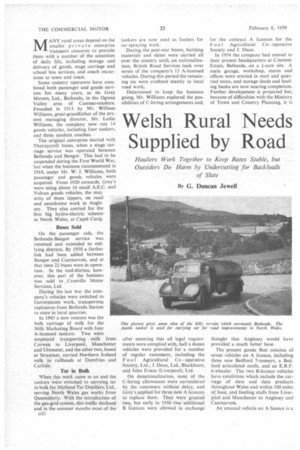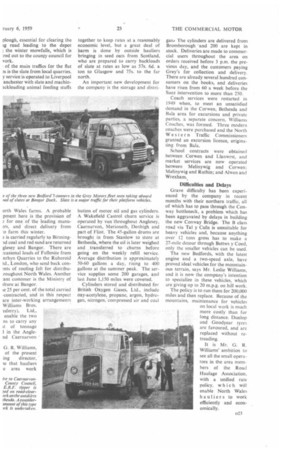Welsh Rural Needs Supplied by Road
Page 64

Page 65

If you've noticed an error in this article please click here to report it so we can fix it.
Hauliers Work Together to Keep Rates 'Stable, but Outsiders Do Harm by Underdating for Bcicklikids .• of Slate
By G. Duncan Jewell MANY rural areas depend on the smaller private enterprise transport concerns to provide them with a number of the amenities of daily life, including storage and delivery of goods, stage carriage and school bus services, and coach excursions to town and coast.
Some country operators have combined both passenger and goods services for many years, as do Grey Motors, Ltd., Bethesda, in the Ogwen Valley area of Caernarvonshire. Founded in 1913 by Mr. William Williams, great-grandfather of the present managing director, Mr. Leslie Williams, the company now run 14 goods vehicles, including four tankers, and three modern coaches.
The original enterprise started with Thornycroft buses, when a stage carriage service was operated between Bethesda and Bangor. This had to be suspended during the First World War, but when the business recommenced in 1918, under Mr. W. J. Williams, both passenger and goods vehicles were acquired. From 1920 onwards, Grey's were using about 16 small A.E.C. and Vulcan goods vehicles, the majority of them tippers, on road and aerodrome work in Anglesey. They also carried for the first big hydro-electric Scheme in North Wales, at Capel Curig.
Buses Sold
On the passenger side, the Bethesda-Bangor service was resumed and extended to outlying districts. By 1930 a further link had been added between Bangor and Caernarvon, and at that time 22 bitses were in operation. In the mid-thirties, however, this part of the business was sold to , Crosville Motor Services, Ltd.
During the last war the company's vehicles were switched to Government work, transporting explosives from Bethesda Station to store in local quarries.
In 1945 a new venture was the bulk carriage of milk for the Milk Marketing Board with four A-licensed tankers. Two were employed transporting milk from Corwen to Liverpool, Manchester and Littoxeter, and the other two, based at Stranraer, carried Northern Ireland milk to railheads at Dumfries and Carlisle.
Tar in Bulk When this work came to an end the tankers were switched to carrying tar• in bulk for Midland Tar Distillers, Ltd., serving North Wales gas works from Queensferry. With the introduction of the gas-grid system, this traffic declined and in the summer months most of the
D22 tankers are now used as feeders for tar-spraying work.
During the post-war boom, building materials and slates were carried all over the country until, on nationalization, British Road Services took over seven of the company's 13 A-licensed vehicles. During this period the remaining six were confined mainly to local road work.
Determined to keep the business going, Mr. Williams explored the possibilities of C-hi ring arrangements and, after ensuring that all legal requirements were complied with, half a dozen vehicles were provided for a number of regular customers, including the Foel Agricultural Co operative Society, Ltd.; J. Dean, Ltd., Blackburn; and John Evans (Liverpool), Ltd.
On denationalization, most of the C-hiring allowances were surrendered by the customers without delay, and Grey's applied for three new A licences to replace them. • They were granted two, but early in 1956 two additional B licences were allowed in exchange for the contract A licences for the Foe I Agricultural Co operative Society and J. Dean.
In 1954 the company had moved to their present headquarters at Coetmot Estate, Bethesda, on a facre site. A main garage, workshop, stores and offices were erected in steel and quarried stone, and storage sheds and loading banks are now 'nearing completion. Further development is projected but, because of difficulties with the Ministry of Town and Country Planning, it is thought that Anglesey would have provided a much better base.
The present goods fleet consists of seven vehicles on A licence, including three new Bedford 7-tonners, a Bedford articulated outfit, and an E.R.F. 6-wheeler. The two B-licence vehicles have conditions which include the carriage of slate and slate products throughout Wales and within 100 miles of base, and feeding stuffs from Liverpool and Manchester to Anglesey and Caernarvon.
An unusual vehicle on A licence is a plough, essential for clearing the is road leading to the depot the winter snowfalls, which is red out to the county council for vork.
of the main traffics for the flat .ts is the slate from local quarries. y service is operated to Liverpool anchester with slate and machinIckloading animal feeding stuffs
orth Wales farms. A probable pment here is the provision of !. for one of the leading manum's, and direct delivery from .0 farm this winter.
is carried regularly to Birmingid coal and red sand are returned glesey and Bangor. There are :casional loads of Fullosite from nrhyn Quarries to the Ruberoid Id., London, who send back conlas of rooting felt for distriburoughout North Wales. Another .ant customer is the Ministry of ilture at Bangor.
le 25 per cent. of the total carried -Contracted, and in this respect are inter-working arrangements Williams Bros. tsferry), Ltd., enable the two ns to carry any it of tonnage I in the Anglend Caernarvon
G. R. Williams, of the present ing director, le that hauliers e area work together to keep rates at a reasonably economic level, but a great deal of harm is done by outside hauliers bringing in seed oats from Scotland, who are prepared to carry backloads of slate at rates as low as 57s. 6d. a ton to Glasgow and 75s. to the far north.
An important new development for the company is the storage and distri
but ion of motor, oil and gas cylinders. A Wakefield Castrol churn service is operated by van throughout Anglesey, Caernarvon, Merioneth, Denbigh and part of Flint. The 45-gallon drums are brought in from Stanlow to store at Bethesda, where the oil is later weighed and transferred to churns before going on the weekly refill service. Average distribution is approximately 50-60 gallons a day, rising to 400 gallons at the summer peak. The service supplies some 200 garages, and last June 1,150 miles were covered.
Cylinders stored and distributed for British Oxygen Gases, Ltd., include oxy-acetylene, propane, argon, hydrogen, nitrogen,-compressed air and coal
gas, The cylinders are delivered from Bromborough 'and 200 are kept in stock. Deliveries are made to commercial users throughout the area on orders received before 3 p.m. the previous day, and the customers paying Grey's for collection and delivery. There are already several hundred consumers on the books, and deliveries have risen from 60 a week before the Suez intervention to more than 250.
Coach services were restarted in 1949 when, to meet an unsatisfied demand in the Corwen, Bethesda and Bala area for excursions and private parties, a separate concern, Williams Coaches, was formed. Three modern coaches were purchased and the North Western Traffic Commissioners granted an excursion licence, originating from Bala.
School contracts were obtained between Corwen and Llanwrst, and market services are now operated between Melinywig and Corwen; Melinywig and Ruthin; and Alwen and Wrexham..
Difficulties and Delays
Grave difficulty has been experienced by the company in recent months with their northern traffic, all of which has to pass through the Conway bottleneck, a problem which has been aggravated by delays in building the new Conway Bridge. The B class road via Tal y Cain is unsuitable for heavy vehicles and, because anything over 12 tons gross has to make a 27-mile detour through Bettws y Coed, only the smaller vehicles can be used.
The new Bedfords, with the latest engine and a two-speed axle, have proved ideal vehicles for the mountainous terrain, says Mr. Leslie Williams, and it is now the company's intention to specialize in these vehicles, which are giving up to 20 m.p.g. on hill work.
The policy is to run them for 200,000 miles and then replace. Because of the mountains, maintenance for vehicles on local work is much more costly than for long distance. Dunlop and Goodyear tyres are favoured, and are replaced without retreading.
It is Mr. G. R. Williams' ambition to see all the small operators in the area mem
bers of the Road Haulage Association, with a unified rate policy, which will enable North Wales hauliers to work efficiently and economically.




























































































































